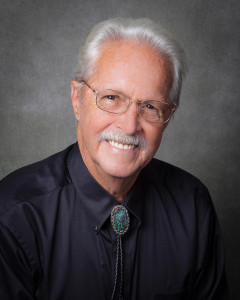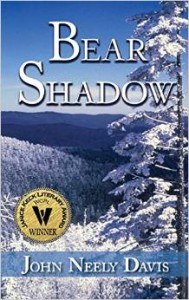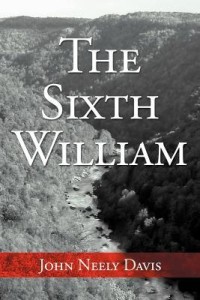Interview with John Neely Davis, Author Bear Shadow
2/13/15—Interview with John Neely Davis, author, Bear Shadow
Last month I reviewed Bear Shadow, winner of the Janice Keck Literary Award for Fiction. Today we get to interview the author, John Neely Davis.
MJT: John, Bear Shadow is introduced as a prequel to your debut novel, The Sixth William. Other than geography, what is the connection between the two stories?
JND: Perhaps the greatest connection is simply a sense of place, of a philosophy of people, and human doctrine that formed what would eventually be known as The Greatest Generation. Most of us are products of our upbringing—occasionally we slip away from it—but generally, we are what we came from. The linkage of Bear Shadow to The Sixth William is the progression of change in the Appalachians.
MJT: Your novel begins and ends in Australia, what was your inspiration for that location?
JND: Australia is a fascinating country. It’s the world’s largest island and home to some of the hardiest people. They have a “can-do” spirit, and I’ve heard it said they are like Americans—just a twenty-five year younger version. I’ve visited the outback and seen the desolation of some of their sheep stations. So the early part of Bear Shadow and the struggles of Geoff and Saint James Rydges are based on my observations. The harbor at Sydney is one of beautiful grace. It was not a stretch of my imagination to envision harbor pubs and their rough and ready clientele. A strong country of strong people produced Geoff.
MJT: Two important characters in the novel are described as having Melungeon heritage. What can you tell us about the facts and myths of Melungeons?
JND: Melungeon is a term traditionally applied to one of numerous “tri-racial isolate” groups of the Southeastern United States. They are associated with the Cumberland Gap area of central Appalachia, which includes portions of East Tennessee, Southwest Virginia, and eastern Kentucky. Other settlers often referred to Melungeons as being of Portuguese or Native American origin. The US Government uncertainly classified them as “free persons of color.”
Supposedly, the women were of exceptional beauty, dark hair, finely chiseled features, smooth copper-hued skin. Melungeon men were considered to be “high tempered and prone to fighting.”
Recent DNA studies have somewhat diminished the mystery about Mulungeons but whatever and whoever they were, it was fun intertwining them in Bear Shadow.
MJT: What made you interested in writing this particular story?
JND: The reason one of Nashville’s greatest song writers stopped writing was that he could not divorce old songs from the new songs he was trying to write. I’ve not reached that stage. Yet. And I have these stories that I need to tell (while I can still remember). The episode of the man trapped in the mountains parallels something between fact and fiction. The Falconnet/Doran trial is loosely based on an 1872 trial in Hamilton County, Tennessee. Preacher Asia Davies is a thinly disguised version of my great-great-grand-father. Mrs. Doran is a compilation of my mother, my aunt, and Lucille Massey, an Oklahoma ranch woman. I know how Geoff felt about Cuva; I felt that way about a young woman almost sixty years ago. I’ve known at least five Mr. Ezras. I’ve got McCamy kin. I am without shame; I bare my mind and soul.
MJT: Is there a message in Bear Shadow that you want readers to grasp?
JND: That’s a tough question. The world is round for a reason. It was designed that way so that we can’t see too far down the road of our life. While some lead beautiful lives and have picturesque ending with a loving family gathered around to share the last moment, others find the road to be much bumpier. It is important that we know that victory comes in many flavors and colors. Frequently, our lives need to be viewed at a time distance before the true beauty is evident.
MJT: Which writers or books inspired you to write novels?
JND: Maybe the first grade Jim and Judy books inspired me. At the age of six, I thought I could write something more exciting than ‘See Jim run’ and ‘Run Judy run’. It took me decades, but I did it. I traveled through everything Zane Grey, James A. Michener, Larry McMurty and Cormac McCarthy wrote. I read James Dickey (Deliverance), Harry Crews (A Childhood: The Biography of a Place), Joseph Wambaugh (The Choirboys), Mark Twain (Tom Sawyer), William Faulkner (The Reivers), Flannery O’Connor (A Good Man is Hard to Find), Rick Bragg (anything he writes), Pat Conroy (The Prince of Tides) and John Grisham (A Time to Kill).
I try to read Lonesome Dove and In Cold Blood once a year.
MJT: How much research did you do for your novel and what did it consist of?
JND: Google and Wikipedia are at the top of everyone’s research list—they might not admit it, but they are. The Foxfire series is indispensible when writing about turn of the century Appalachians. My grandfather was born in 1870 and my father in 1900. They lived everything I wrote about—homegrown research.
MJT: What is the hardest thing about writing a fictional story?
JND: It’s the ending. After all, the writer is a temporary God. He concocts the country, the people, their lifestyles, and everything that happens in their life. It’s similar to managing the Ant Farm game. Everything is under our control. Then at some point, things have to end. The hero/heroine cannot go on forever. Even if they live through the end of the book—the writer knows there is an ending.
MJT: If you could meet your favorite author, living or dead, who would it be and what questions would ask him?
JND: The first slam-dunk question you have asked. Hands down, it is the folks that experienced or wrote the Bible. I want to know in more detail what was here when everything started. I want to know about the healing, the parting of the sea, the plagues, the Passover, the great battles, the kind and evil women, the great generals, the betrayals, and the crucifixion. And I want to know about the end—I’m an endings guy.
MJT: What was one of the most surprising things you learned in creating your novels and short stories?
JND: Another no brainer. It is the amount of time a writer spends before the computer: writing, researching, rewriting and then rewriting again and again. It is the sense of accomplishment when one feels the perfect has been written—and the disappointment when the flaws surface.
MJT: As an award winning author what advice to you have for other writers?
JND: Have patience. Rome wasn’t built in a day. The first cake one bakes is not perfect; the first nail driven will probably bend. But tomorrow is a new day or a new year, and you can start again. Your writing will improve. Surround yourself with people who have skills of critiquing, be willing to fight the battle of The Midnight Disease (work just a little later), read and then read more, have an understanding spouse, be determined. You can bake a good cake and you can drive the nail on the first try without bending it. Believe in your talent and be willing to grow.
MJT: What is your current project?
JND: I got tangled up in writing a western novella. It has now grown into a trilogy. It starts with a Korean POW returning to the dry country of New Mexico and searching for his life. Then, I had to tell the story of his father. And after that is the story of his son. So, you see what I told you about the ending being the hardest part of writing.
I am also working with a group of very talented local (Franklin, Tennessee) authors on a book of short stories roughly based on the family.
MJT: What other novels and stories have you published and where can readers find them?
 JND: Prior to Bear Shadow, I wrote The Sixth William and western short stories. Everything is available on Amazon.com. Or pester your local bookstore to order them. Who knows, you might be on the cutting edge of savvy readers in your town.
JND: Prior to Bear Shadow, I wrote The Sixth William and western short stories. Everything is available on Amazon.com. Or pester your local bookstore to order them. Who knows, you might be on the cutting edge of savvy readers in your town.
For more information, see: http://www.amazon.com/-/e/B00ROAVUBC or http://johnneelydavisauthor.com/
Michael J. Tucker
Growing up in the cold northern climate of Pittsburgh, PA, and an only child, Mike was often trapped indoors and left to his own devices, where he would create space ships out of cardboard boxes, convert his mother’s ironing board into a horse and put on his Sunday suit and tie and his father’s fedora and become a newspaper reporter or police detective. This experience left him with an unlimited imagination and the ability to write electrifying short stories and novels.
Mike is the author of two critically acclaimed novels, Aquarius Falling and Capricorn’s Collapse. He has also published a collection of short stories entitled, The New Neighbor, and a poetry collection; Your Voice Spoke To My Ear. His poem, The Coyote’s Den, was included in the Civil War Anthology, Filtered Through Time.
He is a judge for the Janice Keck Literary Award, and the moderator of the Williamson County Library Writers’ Critique Group.
Reviewers of Mike’s novels have compared his writing to: Thomas Wolfe’s I Am Charlotte Simmons, and J. D. Salinger’s Catcher in the Rye. Albert Beckus, Professor Emeritus of Literature at Austin Peay University recently wrote of his novels: “They move naturalistically in the American literary tradition of Theodore Dreiser’s An American Tragedy, but with a twist…as found in The Great Gatsby.”
- Web |
- More Posts(22)